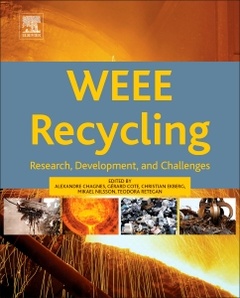WEEE Recycling Research, Development, and Policies
Coordonnateurs : Chagnes Alexandre, Cote Gérard, Ekberg Christian, Nilsson Mikael, Retegan Teodora

WEEE Recycling: Research, Development, and Policies covers policies, research, development, and challenges in recycling of waste electrical and electronic equipment (WEEE). The book introduces WEEE management and then covers the environmental, economic, and societal applications of e-waste recycling, focusing on the technical challenges to designing efficient and sustainable recycling processes?including physical separation, pyrometallurgical, and hydrometallurgical processes. The development of processes for recovering strategic and critical metals from urban mining is a priority for many countries, especially those having few available ores mining.
Introduction
Alexandre Chagnes, Gerard Cote, Christian Ekberg, M. Nilson and Teodora Valeria Retegan
1. Waste electrical and electronic equipment take-back schemes
Richard Toffolet
2. Dynamic representation of the stocks and fluxes of metals in the economy
Dominique Alain Guyonnet
3. Physical separation processes in WEEE recyclinghe recovery of metals from WEEE
Nour-Eddine Menad
4. Electrostatic Separation of Metals and Plastics from WEEE
Lucian Dascalescu
5. Pyrometallurgical processes for the recovery of metals from WEEE
Burçak Ebin and Mehmet Ikbal Isik
6. Hydrometallurgical processes for the recovery of metals from WEEE
Teodora Valeria Retegan and Cristian Tunsu
7. Lifecycle analyses in WEEE recycling
Gonzalo Rodriguez Garcia and Marcel Weil
Conclusion
Alexandre Chagnes, Gerard Cote, Christian Ekberg, M. Nilson and Teodora Valeria Retegan
Chemical engineers, metallurgists, technicians from industry and academic researchers involved in hydrometallurgy, life cycle analysis, and recycling. Professors and students from university are also key reasers, as more and more interest and concern is emberging around WEEE recycling in educational programs.
Professor Alexandre Chagnes published 141 papers including 122 papers in peer-reviewed journals, 6 books including two books as Editor for Elsevier, 10 book chapters and 2 patents in the fields of electrochemistry and chemistry applied to lithium-ion batteries and hydrometallurgy. His research aims to develop the basic knowledge to remove technological barriers for the recovery of metals from primary and secondary resources. He created the French network of Hydrometallurgy PROMETHEE I 2014, which gathers 31 french laboratories. Professor Chagnes is currently the Director of the Industrial Partnerships at ENSG (Engineering School of Geology of Nancy) and Scientific Director of the LabEx RESSOURCES21 – a cluster of 9 laboratories focusing on the geochemical cycle of metals, raw material characterization, environmental and societal impact of mining, extractive metallurgy, and resource economics.
ENSCP - IRCP - 11 Rue Pierre et Marie Curie 75005 Paris.
Gerard COTE, senior professor, has been working over thirty eight years in the field of hydrometallurgy. He is currently Deputy Director of the ENSCP in charge of industrial relationships and project leader of the ParisTech Chairs “Nuclear Engineering and “Urban Mines supported by AREVA and Eco-syste`mes, respectively. He is author of 170 publications in peer-reviewed journals (130) and proceedings (40) in the field of solution chemistry and separation science and is inventor of 3 international patents.
Christian Ekberg is a full professor in Industrial Materials Recycling (since 2007) as well as a full professor in Nuclear Chemistry (since 2012) at Chalmers University of Technology, Göteborg, Sweden. He is also an elected member of the Royal Swedish Academy for Engineering Sciences. The main research focus on the last 25 years has been solution chemistry of the lightest to the heaviest elements in the periodic table (thermodynamics, solvent extraction etc) as well as statistical uncertainty analy
- Describes the two metallurgical processes—hydro- and pyro-metallurgy—and their application in recycling of metals
- Provides a life cycle analysis in the WEEE recycling of metals
- Outlines how to determine economic parameters in the recycling of waste metals
- Discusses the socio economic and environmental implication of metal recycling
Date de parution : 07-2016
Ouvrage de 234 p.
19x23.3 cm
Thèmes de WEEE Recycling :
Mots-clés :
collection; competition; corona discharge; dismantling; dry process; e-waste; economic models; electric charge; electric field; electrostatic induction; electrostatic separation; end-of-life; environmental impact assessment; extended producer responsibility; granular materials; hydrometallurgy; industrial planning; innovation; LCA; level playing field; management; manual; material flow analysis; mechanical; metal recovery; MFA; organization; physical properties; policy recommendations; pyrochemistry; pyrolysis; pyrometallurgy; rare earth elements; recycling; REE; research; review; separation; smelting; take-back systems; triboelectricity; waste electrical and electronic equipment; waste management; waste prevention; waste treatment; WEEE; wet process; whole life cycle



